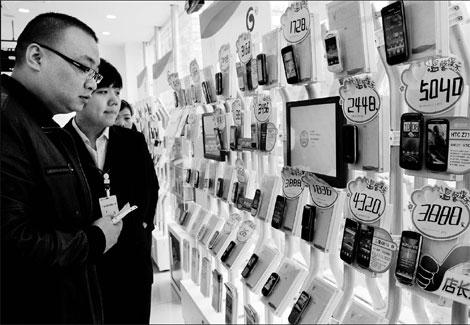The book peddlers in Beijing are busy seeking underground channels to purchase pirated copies of Steve Jobs' biography. Selling at 20 yuan ($3.15) a copy, they say it's probably the last chance to exploit the memory of Jobs, the founding father of Apple Inc - the world's most valuable company in terms of market capitalization.

A salesman showing a customer different foreign and Chinese smartphones at a China Mobile shop in Zhengzhou, the capital city of Central China's Henan province. [Sha Lang/China Daily]
Smartphone marketers are also using the Apple guru's death as a golden opportunity to create a bigger market share in China - one of the most valued smartphone markets worldwide.
The nation is now the second-largest smartphone market, following the United States, said the multinational research firm Canalys Research. The number of smartphone shipments in China in the third quarter of this year was 23.2 million units, an increase of 160 percent on an annual basis.
"The Chinese smartphone market is seeing an explosive growth, not least from domestic vendors such as Huawei Technologies Co Ltd and ZTE Corp," said Nicole Peng, a Shanghai-based director for Canalys China.
Apple's healthy sales were not diminished by the death of its former chief executive officer. According to a poll result published by the United States financial services firm Morgan Stanley, Apple's iPhone is now the most desired mobile phone among the Chinese people. The former leading company, Nokia Oyj, is falling out of favor rapidly.
The poll, released days after Jobs died at his California home on Oct 5, showed that 34 percent of respondents say the iPhone would be their first chose for their next cellphone. Nokia, by contrast, received the thumbs up from only 16 percent of those polled, slumping by eight points. Morgan Stanley interviewed more than 20,000 Chinese cellphone users for the poll.
Nokia is not going down without a fight. On Oct 26, exactly three weeks after Jobs' death, the Finish cellphone manufacturing giant released its first ever Windows phone - the Lumia 800 - hoping the gadget would close the gap between Nokia and other world-leading smartphone makers such as Apple and Samsung Electronics Co.
The Lumia 800 is likely to be released in the Chinese mainland market at the beginning of 2012. However, stiff competition from its competitors is likely. Apple's iPhone 4S will be released at almost the same time on the mainland, and the sales momentum of Samsung's Galaxy S2 (also known as Galaxy S II) has remained strong four months after it entered the Chinese market.
Both the iPhone 4S and Galaxy S2 feature dual-core processors but the Lumia 800 has just one processor.
More bad news for Nokia is that Chinese local cellphone makers are entering the smartphone market with a vengeance.
Chinese communications equipment maker ZTE sold more than 5 million smartphones in China during the first half of this year, an increase of more than 400 percent year-on-year, said the company.
ZTE's rival, Huawei, also expects its mobile phone sales to hit 14 billion yuan ($2.19 billion) by the end of the year with a total shipment of 22 million units in China.
"Huawei and ZTE are delivering good quality, attractive smartphones on the Android platform for both the domestic and foreign markets, and their aggressive pricing strategies are enabling them to ship large volumes," Nicole Peng from Canalys said. "They will continue to be an increasingly disruptive force in the global market in the coming quarters."
Both Huawei and ZTE are offering low- and medium-priced smartphones to the market. The lowest price for ZTE's smartphones was around 1,000 yuan, compared with iPhone 4's 4,492 yuan.
The lower prices of Chinese cellphone makers make smartphones more accessible to more people.
China is the third-largest smartphone market by adoption rate. About 35 percent of urban Chinese cellphone users use smartphones, according to a survey jointly conducted by Google Inc and research service company Ipsos in November.
Singapore has the highest smartphone adoption rate of 62 percent, and Australia follows with 37 percent, the report said.
Although the survey only interviewed about 2,000 Chinese cellphone users in big cities such as Beijing, Shanghai, Guangzhou and Wuhan, where third-generation (3G) communication networks are well-established and provide smartphone users with a higher download speed, China's overall smartphone adoption rate is put at around 20 percent. Given that there are more than 950 million cellphone users nationwide, that scale makes the Chinese smartphone market even more appealing to manufacturers.
In the meantime, telecommunication carriers are also competing intensively to lure more 3G subscribers, which may help to boost the number of cellphone users.
China's top three carriers have established their own 3G networks across the nation.
China Mobile Ltd, one of the three, plans to sell 60 million cellphones by the end of 2012. It is expecting smartphones to make up 50 percent of total sales by then.
The number of people in China accessing the Internet through mobile phones reached 303 million as of the end of 2010, statistics from the China Internet Networks Information Center show.
China had more than 102.46 million 3G subscribers at the end of September, accounting for more than 10 percent of total mobile phone users, according to the Ministry of Industry and Information Technology.
1 2 Next




